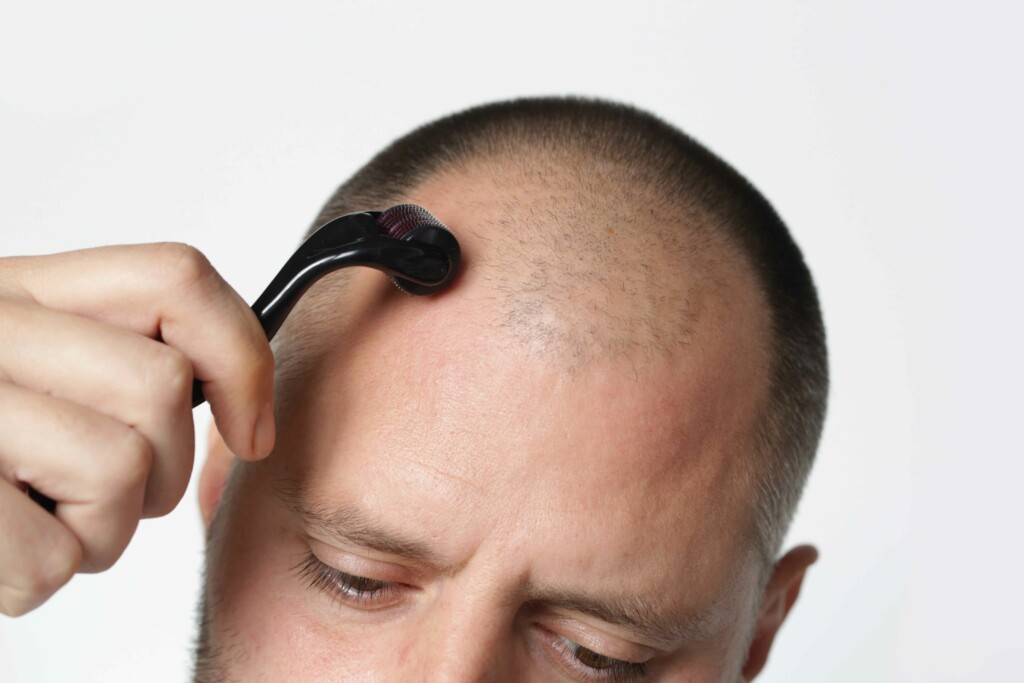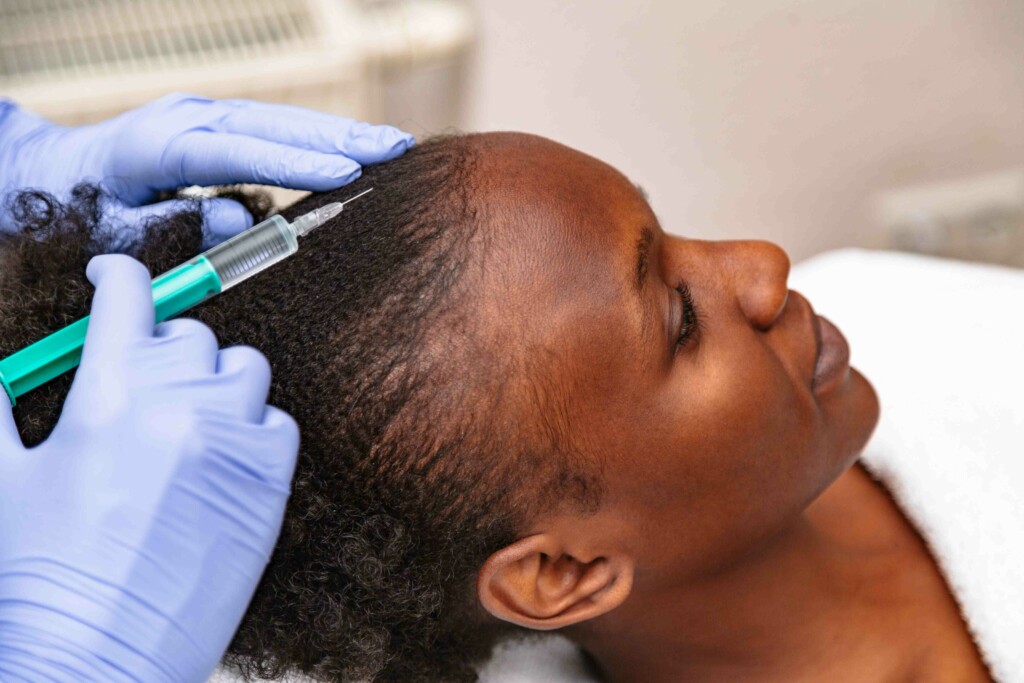Dutasteride is an androgen blocker that’s approved to treat male pattern hair loss (also known as androgenetic alopecia) in Japan and South Korea. It’s also FDA-approved for the treatment of benign prostate hyperplasia — commonly known as an enlarged prostate. This oral medication is generally thought of as a stronger version of finasteride, so it’s sometimes used off-label to treat androgenic alopecia.
Dutasteride’s strength is also considered its weakness. Historically, it’s been assumed that if it’s stronger than finasteride, it may also have the potential to produce more systemic side effects. (1) In order to reduce the risk of such side effects, an alternative formulation, topical dutasteride, is currently being explored.
What Is Topical Dutasteride?
Topical dutasteride is a prescription-only dihydrotestosterone (DHT) blocker that is made with the same active ingredient as oral dutasteride. It’s simply applied in topical form, directly to your scalp.
Dutasteride is an anti-androgenic drug, like finasteride. But unlike finasteride, it blocks DHT, the main hormone involved in pattern baldness, in multiple ways. It also has a longer half-life, which means that it lasts longer in the body compared to finasteride. (1)
You should be aware that the FDA’s approval of oral dutasteride does not mean that this medication can be used in every kind of formulation. In fact, topical dutasteride is not approved in any country for the treatment of any condition.
Can You Buy Topical Dutasteride?
If you’ve already been exploring topical dutasteride, you’ll likely have noticed that a handful of hair loss clinics and private practices have started advertising the sale of this product online. These products are generally only available by prescription to people being treated by a doctor or at that practice.
However, there’s no standardized formulation for this version of the drug. Each of these websites could be selling the exact same topical dutasteride product… or totally different ones. This also means that you might see a wide variety of different items advertised — from a dutasteride topical gel to a dutasteride cream, lotion, or spray.
Rather than selling you topical dutasteride to use at home, private practices may also offer the product as part of a hair loss treatment plan. Some of these clinics combine dutasteride with microneedling treatments, while others perform dutasteride mesotherapy, injecting topical dutasteride into the scalp.
Does Topical Dutasteride Work?
The creation of many different formulations of topical dutasteride have been reported in the scientific literature. Yet, topical dutasteride isn’t usually studied on its own. This anti-androgen isn’t considered to be very well absorbed by the skin. Performing dutasteride mesotherapy or combining microneedling treatments with dutasteride is consequently much more popular. (1,6)
In theory, some formulations of topical dutasteride could be very effective. Researchers have mixed or inserted dutasteride into biodegradable microspheres, nanoparticles, lipid nanocarriers, nanocapsules, and other drug delivery systems to try and make this medication more easily absorbed into the scalp. (1)
Yet, while these experiments have been successful in vitro and in animal studies, there’s virtually no data on how effective these formulations are in people. The studies that do exist have combined topical dutasteride with other topical drugs. This means that it’s not possible to understand the exact effect of the dutasteride within the blend of medications. (2)
Is Dutasteride Mesotherapy Effective?
Dutasteride mesotherapy has been shown to be effective in treating male pattern hair loss. Of course, the effectiveness of treatment depends on the number of injections you receive and the concentration of those injections. But in general, dutasteride mesotherapy is thought to have the potential to increase hair density and the thickness of hair strands. (1)
The effectiveness and results of dutasteride mesotherapy are much more mixed when used to treat female pattern hair loss. One study even reported that this treatment worsened symptoms. (1)
However, dutasteride mesotherapy hasn’t been studied extensively in women, so take these findings with a grain of salt. Anti-androgenic drugs are infrequently used to treat female androgenetic alopecia. These medications are generally not considered to be safe for females of childbearing age as they can cause birth defects. (1)
What Is the Best Dose of Topical Dutasteride?
There’s no standardized dosing regimen or concentration for topical dutasteride products. So unlike minoxidil, which is FDA-approved in concentrations of 2% and 5%, your dutasteride gel, serum, or spray could be sold in a wide range of concentrations. The typical concentration of the product will depend on whether it’s truly being applied topically (that also means without any microneedling involved) or injected as part of a mesotherapy treatment.
In studies where topical dutasteride is used alongside microneedling, the concentration of topical dutasteride has been fairly similar, with one study administering 1 milliliter doses of 0.01% solution and the other administering 2 milliliter doses of 0.02% solution. Dutasteride mesotherapy injections, on the other hand, have a much broader range, and have been administered at concentrations as low as 0.005% or as high as 0.02%. (1,4,5)
In both cases, these doses are fairly low. When dutasteride pills are taken for hair loss, the medication is usually taken in daily doses of 0.5 milligrams. The effectiveness of daily doses as high as 2.5 milligrams have been studied. (1)
At the moment, one phase II topical dutasteride clinical trial just finished recruiting. This trial, which involves the use of dutasteride as a topical spray within a lipid drug delivery system, will have men spray about 1.5 milligrams of dutasteride on their scalps each day for 7 months. While the results are not yet publicly available, they may eventually give some insight into the right dose for topical dutasteride treatments. (3)
Topical Dutasteride Side Effects
The side effects of topical dutasteride sprays and gels are not definitively known — at least, not when they’re applied without microneedling. That’s another finding the phase II clinical trial is hoping to find out. (3) However, after microneedling, topical dutasteride side effects have been reported as headaches, pain, sensitivity, irritation, and itching. (4,5) Similar results have been reported following dutasteride mesotherapy. (1)
Dutasteride mesotherapy involves intradermal injections into the scalp at a depth of about 3 or 4 millimeters. This technically means that the dutasteride injected should remain localized, at the scalp, rather than entering your body’s circulatory system. However, you should know that this doesn’t always work out this way. (1)
No severe side effects have been reported following dutasteride mesotherapy. However, oral anti-androgenic drugs like finasteride and dutasteride have been known to cause unpleasant sexual side effects like loss of libido, erectile dysfunction, and difficulty ejaculating, along with other similar issues. It is not known how often these side effects happen, or whether they can be permanent. (1)
Researchers looking out for similar side effects noticed that dutasteride mesotherapy affected the fertility of men receiving treatment, causing a decline in semen volume, sperm concentration, and sperm motility. This implies that the topical dutasteride injected in this study was absorbed from the scalp and became systemic in these men’s bodies. Unfortunately, it also means that injecting dutasteride into the skin isn’t a guaranteed way of avoiding sexual and other systemic or long-term side effects. (1)
Should You Try Topical Dutasteride?
Given the current amount of studies that exist and the lack of reported serious side effects, it would be hard to say that topical dutasteride is unsafe. However, topical dutasteride certainly has not been thoroughly researched, especially not in women. There are no established treatment protocols for this medication, and the concentration of the drug still varies substantially across studies.
If you’re definitely interested in trying topical dutasteride, you’ll likely be safest if you join a clinical trial. If you’re not eligible or living in the region where the trial is taking place, consider another topical hair loss treatment. Both minoxidil and topical finasteride have been researched much more extensively.
If you’re specifically interested in anti-androgens, consider other topical anti-androgenic drugs that are in clinical trials, like Kintor Pharma’s pyrilutamide (KX-826). Cosmo Pharma’s high-strength clascoterone (best known by its brand name, Breezula®) is another topical anti-androgen. Investigators are currently recruiting for Breezula® phase III clinical trials.
If none of these options are ideal for you, you may want to explore nutraceutical DHT blockers. These plant-based ingredients, which are usually considered to be weaker than finasteride and dutasteride, are often added to shampoos, conditioners, and leave-in serums. Products like these can complement your doctor-prescribed hair loss treatment.
References
- Anastassakis, K. (2022). Dutasteride. In K. Anastassakis (Ed.), Androgenetic Alopecia From A to Z : Vol. 2 Drugs, Herbs, Nutrition and Supplements (pp. 77–95). Springer International Publishing.
- Rafi, A. W., & Katz, R. M. (2011). Pilot Study of 15 Patients Receiving a New Treatment Regimen for Androgenic Alopecia: The Effects of Atopy on AGA. ISRN Dermatology, 2011, 241953.
- Fundacion para la Investigacion Biomedica del Hospital Universitario Ramon y Cajal. (2022). Exploratory Clinical Trial of Safety and Efficacy of Daily Application of Topical Dutasteride in Men With Androgenic Alopecia. (Clinical Trial Registration No. NCT05599243). Clinicaltrials.gov.
- Nada, E., El Sharkawy, R., Abd El- Maged, W., & Abo Elmagd, M. (2018). Topical dutasteride with microneedling in treatment of male androgenetic alopecia. Sohag Medical Journal, 22(1), 387–400.
- Sánchez-Meza, E., Ocampo-Candiani, J., Gómez-Flores, M., Herz-Ruelas, M. e., Ocampo-Garza, J., Orizaga-y-Quiroga, T. l., Martínez-Moreno, A., & Ocampo-Garza, S. s. (2022). Microneedling plus topical dutasteride solution for androgenetic alopecia: A randomized placebo-controlled study. Journal of the European Academy of Dermatology and Venereology, 36(10), e806–e808.
- Wollina, U. (2022). Androgenetic alopecia – Update 2022. Cosmoderma, 2, 92. https://doi.org/10.25259/CSDM_110_2022
Last updated July 2023




